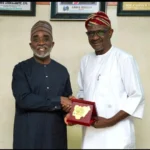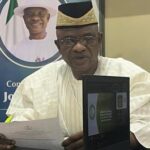By Gabriel Agbeja
Mr Musa Ibrahim, the Acting Permanent Secretary of the Federal Ministry of Transport, has urged the ministry’s staff to uphold integrity, honesty, and transparency in performing their duties.
Ibrahim, represented by Dr Vivian Nwosu, the Director of Special Duties in the ministry, gave the advice during the 2025 Anti-Corruption and Transparency Unit (ACTU) sensitisation and enlightenment workshop on Thursday in Abuja.
He emphasised that such attitudes would not only strengthen the ministry but also contributed to national development.
“This workshop aims to sustain a zero-tolerance stance against corruption and unethical practices within the Federal Ministry of Transportation.
“We encourage all staff to institutionalise integrity, honesty, and transparency, viewing any misuse of resources or power for personal gain as a serious breach,” Ibrahim added.
He stressed the importance of creating a workplace culture rooted in integrity, honesty, transparency, and good governance to minimise corruption and promote accountability.
He also highlighted that an organisation that embraced these values signalled its commitment to progress and development.
“Integrity in the workplace benefits both the government and its citizens. It fosters an open, positive work environment and strengthens teamwork.
“As public servants, it is crucial that you are reliable, trustworthy, and demonstrate a strong work ethic,” Ibrahim added.
He further emphasised the importance of accountability, urging staff to take responsibility for their actions, make sound decisions under pressure, and provide high-quality services to citizens.
Ibrahim also noted that with the political will to enforce ethical standards and penalise non-compliance, corruption could be eradicated in a sustainable manner.
He called for every staff member to demonstrate consistent integrity, discipline, and responsibility in their roles.
Mr Musa Aliyu, Chairman of the Independent Corrupt Practices and Other Related Offices Commission (ICPC), who was represented by Mr Olusegun Adigun, a senior official in the ICPC’s System Study and Review Department, also addressed the workshop.
He discussed the severe consequences of corruption, including its negative impact on foreign investment and Nigeria’s global reputation.
“Corruption leads to a decline in foreign investment, tarnishing Nigeria’s national image.
“Additionally, corruption contributes to poverty and preventable deaths,” Aliyu said.
Aliyu also revealed the financial cost of corruption in Nigeria, stating that the country lost approximately 30 billion dollars annually from 2005 to 2019 due to revenue leakages caused by corruption and illicit.(NAN)(www.nannews.ng)
Edited by Abiemwense Moru












